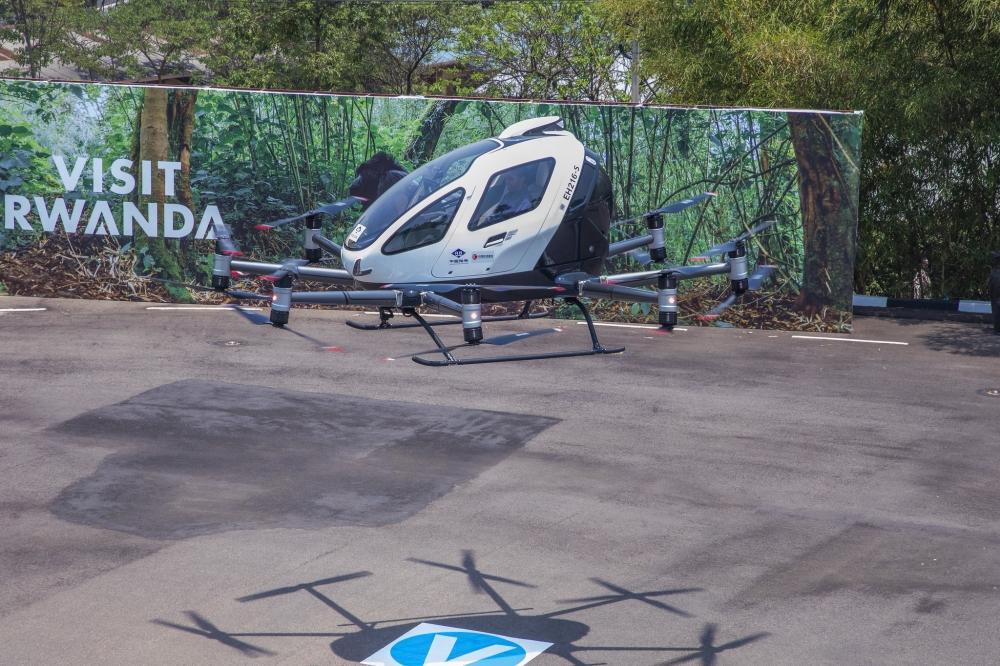Edwin Musoni
Africa-Press – Rwanda. When the story of Africa’s transformation is told decades from now, Rwanda will stand as a nation that refused to be confined by its geography, history, or size. Instead, it chose to become a laboratory for the future, where technologies once seen as out of reach for the continent are being tested, refined, and scaled for the world. From self-flying taxis to AI hubs, drone logistics, advanced medical technologies to nuclear energy pilots, Rwanda is not just catching up. It is leapfrogging into the future.
Just this month, (September 2025), Kigali’s skies showcased what many considered science fiction: Africa’s first self-flying electric air taxi, the EH216-S eVTOL. Revealed at the Aviation Africa Summit, it was more than a spectacle; it was a statement. While most of the continent still wrestles with traffic congestion and inadequate infrastructure, Rwanda is asking a different question: why wait decades to build traditional systems when the future can already take flight?
The air taxi is not just mobility reimagined; it is a symbol of possibility, showing that a small, landlocked nation can redefine urban transportation on its own terms.
This willingness to embrace the frontier extends to the ground as well. Drones, once experimental, have become lifelines. Zipline’s operations in Rwanda deliver blood, vaccines, and medical supplies to remote hospitals in minutes rather than hours—a literal lifesaver.
But Rwanda is not content being a consumer of technology. By 2030, TRL Space Rwanda plans to manufacture drones and satellites locally, transforming the country into a hub of African aerospace innovation. Complementing this ambition, a Rwf13 billion drone operations centre is being built in Huye District, designed to host drones with wingspans of up to 20 meters. Rwanda is creating a full ecosystem: training, manufacturing, logistics, and regulation, all interwoven to ensure the country is building the future, not just buying it.
Innovation requires energy, and Rwanda is tackling that challenge head-on. In 2023, the country signed an agreement with Dual Fluid, a Canadian-German firm, to test a pilot nuclear reactor. Many would consider this ambitious for a nation of Rwanda’s size. The government sees nuclear energy not as a risk but as a strategic necessity. Industrial growth, urbanization, and climate challenges demand a reliable, resilient energy mix.
By embracing advanced nuclear technology, Rwanda is asserting that small nations can pursue solutions once reserved for the largest economies, and do so safely and sustainably.
Technology and energy alone would be enough to put any nation on the map yet Rwanda is also investing in the digital frontier. Artificial Intelligence, often called the defining technology of our age, is not being left to external players. Recently, Gates Foundation committed $7.5 million to establish an AI scaling hub at Kigali’s Centre for the Fourth Industrial Revolution. The hub is designed to incubate AI solutions with real-world impact: improving crop yields, predicting disease outbreaks, and enhancing educational delivery.
By opening this space to neighbouring nations, Rwanda is not just developing its own capacity, it is creating a continental platform for African innovation, ensuring the continent controls the tools shaping its future.
What binds these ambitious projects together is vision paired with governance. Technology without regulation creates chaos; regulation without vision produces stagnation. Rwanda demonstrates that agile, thoughtful governance can unlock extraordinary opportunities.
Its clarity, consistency, and courage attract partnerships and investments that others can only aspire to. This is a small nation showing the world that leadership, strategy, and foresight can outweigh scale and size.
Critics may argue that these initiatives are overly ambitious, that Rwanda should focus first on conventional infrastructure before reaching for futuristic technologies. Yet history is written by those willing to bet on the future. Rwanda’s approach is about designing its own destiny, rather than inheriting limitations imposed by circumstance. Its young population, like Africa’s at large, cannot afford outdated systems. By building advanced mobility networks, drone logistics, energy independence, and AI infrastructure, Rwanda proves that the continent can take bold leaps rather than incremental steps.
The lessons Rwanda offers are clear. Small nations can lead, innovation can be purposeful, and vision can drive economic growth and social impact. The leapfrogging is happening now, in real time, in Kigali and across Rwanda. From the skies to the labs, from hospital corridors to energy grids, Rwanda is demonstrating how a country can harness technology to shape its future.
Rwanda is rising, not cautiously, but boldly. It is not waiting for the world to catch up. It is defining what Africa’s future can look like and, while the world watches with a mix of curiosity and scepticism, one thing is certain: Rwanda is not just ready for the future, Rwanda is seeing the future.
Source: The New Times
For More News And Analysis About Rwanda Follow Africa-Press






